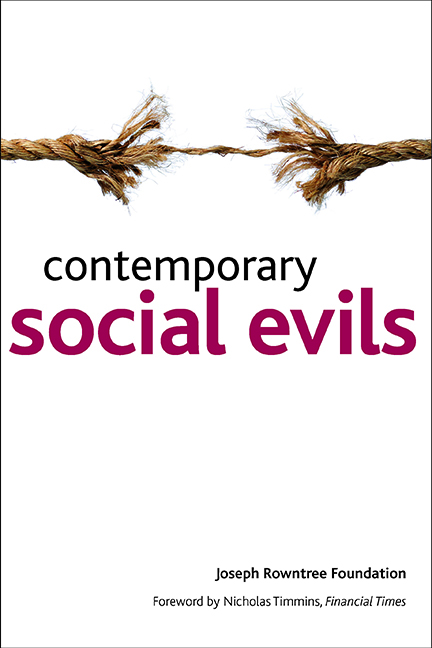Book contents
- Frontmatter
- Contents
- Foreword
- Acknowledgements
- Notes on contributors
- 1 Introduction
- 2 ‘Social evils’ and ‘social problems’ in Britain since 1904
- Section 1 Public Voices
- Section 2 Viewpoints
- A decline of values
- Distrust
- The absence of society
- Individualism
- Inequality
- Section 3 Reflections
- Appendix: How the ‘social evils’ consultations were organised
- Index
18 - Reflections on social evils and human nature
Published online by Cambridge University Press: 26 January 2022
- Frontmatter
- Contents
- Foreword
- Acknowledgements
- Notes on contributors
- 1 Introduction
- 2 ‘Social evils’ and ‘social problems’ in Britain since 1904
- Section 1 Public Voices
- Section 2 Viewpoints
- A decline of values
- Distrust
- The absence of society
- Individualism
- Inequality
- Section 3 Reflections
- Appendix: How the ‘social evils’ consultations were organised
- Index
Summary
It would I suppose be surprising if a project on the new social evils were to conclude that there weren't any. But was it inevitable that there would be such agreement about what Zygmunt Bauman (Chapter 12) calls ‘the withdrawal of society’? Most of the public and most of the intellectuals consulted by the Joseph Rowntree Foundation spoke with one voice; the greatest evil is society's retreat in the face of rampant individualism.
It is in the explanations for this phenomenon, and the emphasis put on its different manifestations, that can be traced to familiar dividing lines. The starting point for writers from the Left, like Neal Lawson (Chapter 13), is the decline of social solidarity, the widening of inequality, the labelling and punishing of the disadvantaged. For thinkers from the Right, like Anthony Browne (Chapter 7), the dilution of behavioural norms and the loss of a shared sense of identity lie behind our sense of social malaise.
On the whole, the public leans towards behavioural rather than structural accounts of social fragmentation, with the poorest – perhaps reflecting their own day-to-day experiences – most inclined to highlight pathologies like criminality, drug use and family breakdown.
All this confirms that we are living in a time of profound social pessimism. Opinion polls show an ever-widening gulf between our view of ourselves and our view of society at large. A major recent BBC poll found that more than nine in ten of us are optimistic about our family's prospects (up from 40 years ago) while an ever-smaller minority (fewer than one in five) shares this optimism about other people.
The contemporary feeling of social unease is undeniable; the dark seam exposed by the JRF is the same one mined by David Cameron in his talk of a ‘broken society’. Yet as A.C. Grayling (Chapter 8) reminds us, a latter-day Harold Macmillan would have every reason for proclaiming that we have never had it so good (this, of course, before the credit crunch, of which more later).
Nor is it simply that we live longer, earn more, travel more and relax more than our parents or grandparents. We are also today more tolerant, better educated and more compassionate, certainly, than our Victorian counterparts. And the last few years have seen serious and successful attempts to reverse the baleful legacy of both 1970s planning and the abandonment of the public sphere in the 1980s.
- Type
- Chapter
- Information
- Contemporary Social Evils , pp. 215 - 224Publisher: Bristol University PressPrint publication year: 2009



